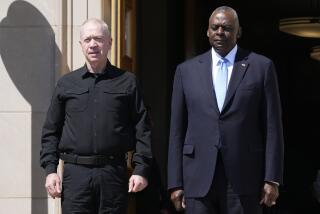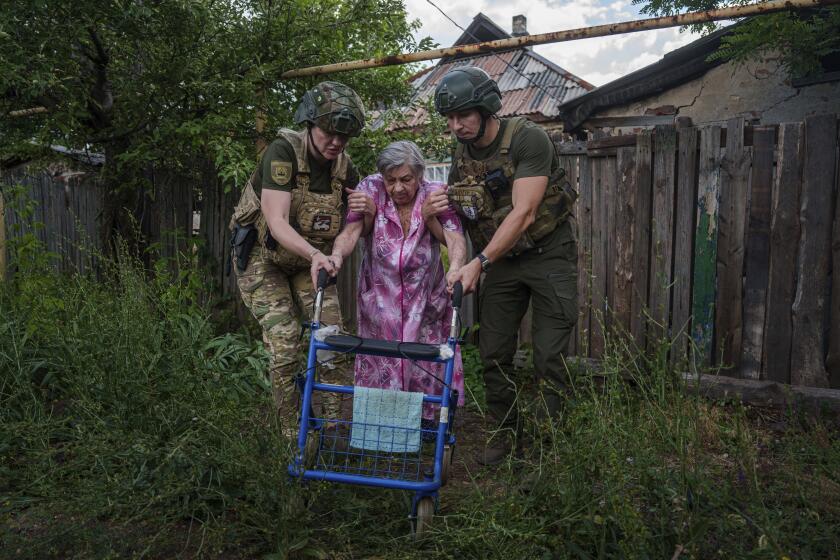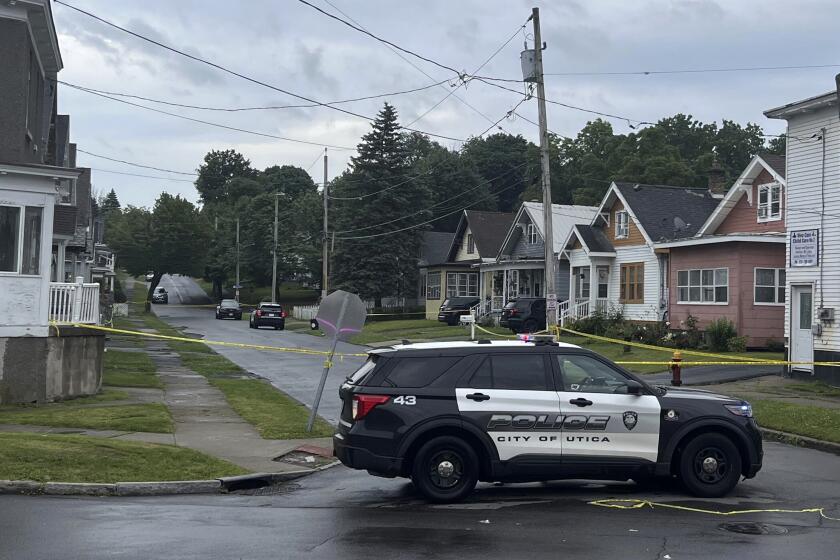Scornful, Angry and Accusing, Ng Awaits Grim Fate
As his attorneys prepare for the difficult task of persuading 12 jurors to spare the life of a man the panel has convicted of a horrendous killing spree, Charles Ng says he is resigned to the probability that he faces death.
“I know I’m in Orange County; this is the most conservative county in the state,” he said in a recent jailhouse interview with The Times. “I have no delusions about why they brought me here. They have accomplished their goal.”
Ng, whose 14-year legal saga has frustrated victims’ families, said he is equally frustrated. He says the media vilified him and the system railroaded his case by sticking him with a lawyer he doesn’t trust and by sending his case to a tough-on-crime county.
“The whole system seems to want to move forward rather than doing it right,” he said.
Today the defense starts its portion of the penalty phase, which will decide whether Ng, 38, will die for his crimes or spend life in prison. Ng’s parents, who flew in from Hong Kong over the weekend, are expected to testify on his behalf. And his lawyers plan to introduce, among other things, Ng’s proficiency in origami, a paper-folding art, as a sign that he has redeemable qualities.
But despite the ominous fate awaiting him, the pudgy, bespectacled man seems more focused on his scorn for the man entrusted with defending him, Orange County Deputy Public Defender William Kelley.
“Kelley is your typical business-as-usual, performance lawyer who doesn’t care about the outcome,” Ng said.
Kelley declined to comment on his relationship with his client.
“We will continue to make our best efforts on Mr. Ng’s behalf, whether he realizes it or not,” said Kelley, a 18-year veteran of the public defender’s office.
Ng’s grievances underscore a case that has been mired in legal entanglements for more than a decade and provide a window into the psyche of the man at the center of one of the longest and costliest prosecutions in state history. Since his arrest in Canada and eventual extradition to California, Ng has filed numerous legal motions complaining about everything from the conditions of his incarceration to the judges and lawyers assigned to his case.
To the families of the victims, they were the obvious delaying tactics of a guilty man. Ng says he is just trying to protect his rights. And he has not run out of complaints.
A seemingly run-of-the-mill shoplifting incident involving Ng and his friend Leonard Lake at a Northern California lumberyard in 1985 led authorities to a virtual killing field at a remote cabin in the Sierra Nevada foothills. Ng fled the lumberyard and Lake was arrested. After a monthlong international manhunt, Ng was arrested in Calgary.
Prosecutors charged that Ng and Lake, 39, lured their victims to the cabin in Calaveras County and then killed them either for money or after forcing them into sexual slavery. It is believed that as many as 25 people perished on the property; forensics experts combing the area found more than 40 pounds of charred human remains scattered on the grounds.
He fought extradition from Canada, which does not have the death penalty, but was returned to California after much political pressure on both sides of the border. His case was transferred to Orange County in 1994 because of extensive pretrial publicity in Northern California.
All along, Ng has maintained his innocence. He testified during the trial that his friend Lake, who committed suicide shortly after being arrested, was the true culprit in the murders.
“When Lake died I took his place as the sacrificial lamb,” Ng said during the interview. But the jury did not buy his story and convicted him in February on 11 of the 12 murders he was charged with. They deadlocked on one count.
Ng spoke little beyond the evidence presented in his trial. He frequently prefaced his statements with “as I testified during the trial,” and at times sounded more like a lawyer arguing a case than a man fearing for his life.
Asked about some of the most damning evidence in the case against him--a videotape of Ng and Lake threatening to rape and shoot two women----Ng was almost academic.
“There is a difference between what I’m thinking at the time and planning to kill people,” he said. “You can make only so many inferences from that tape. If I was Kelley I would have attacked the evidentiary value of the tape.”
Ng’s defense team did in fact try to convince the jurors that the tape provided no direct proof of Ng’s involvement in any of the murders. Ng said they should have done a better job.
An Early Penchant for Military, Guns
Ng came to the U.S. from his native Hong Kong in 1978 on a student visa to attend the College of Notre Dame at Belmont. He was studying biology, but dropped out after the first year because of poor grades, he said.
Ng said he and his two older sisters lived a sheltered life in Hong Kong. In America, Ng saw the opportunity to shape his own destiny.
After dropping out of college, Ng found refuge in the U.S. Marines. He said he grew up watching American war movies and that he had always been fascinated by the military. In San Francisco, he met a recruiter who enlisted him even though he was not a citizen or a permanent resident.
He eventually ended up at the Kaneohe Marine Corps Base in Hawaii, where he ran afoul of military authorities when he and three other soldiers raided a weapons depot.
“It was just a chance for gun enthusiasts to get their hands on things that you couldn’t get in the outside world,” he said.
Rather than face court-martial, Ng fled. He made his way to Northern California, where he had his fateful meeting with Lake, a fellow Marine and a Vietnam veteran.
“Part of me saw him as the father or big brother I always wanted,” Ng said.
Their friendship was interrupted in 1982 when federal authorities raided their mobile home and seized a large stash of weapons and explosives. Ng, wanted by the military, was court-martialed. Lake jumped bail and became a fugitive.
Ng served time at Fort Leavenworth, Kan., and rejoined Lake in 1984. According to authorities, that’s when the killing spree started.
Ng is scrutinizing the evidence in his trial, going through it with his own fine-tooth legal comb. Regarding the videotaped footage of him getting a massage from a naked Kathi Allen, 18, one of the victims he’s convicted of killing, he pointed out that he and Allen are facing away from the camera and that it is not clear whether he is enjoying it.
He said he agreed to get in bed with Allen to impress Lake.
“I feel remorseful for certain things that on a tangential basis I had some participation in,” he said. “I took responsibility [for those acts]. I already got punished for the part I took.”
That assertion infuriates families of the victims.
“I think it is the last attempt to save his life,” said an angry Dian Allen, Kathi’s younger sister, from her home in San Jose. “How does he expect anyone to believe that he feels any remorse when he sat in that courtroom stone-faced, showed no reaction, and now he’s going to turn around and say he felt bad? Give me a break.”
Lola Stapley, whose son Scott Stapley, 26, was also killed, said she is not surprised by Ng’s second-guessing of his trial.
“He has had a long time to think about it” to get his story straight, Stapley, 70, said. “By fair trial, I don’t know what else he wants. He’s had 14 years.”
Others disagree. Michael Burt, a San Francisco deputy public defender who was originally assigned to Ng’s case, said Ng has a legitimate claim that his rights were denied.
“These lawyers were thrust upon him over his objection,” Burt said.
Burt said it is only natural that Ng would feel the system is conspiring against him after being denied an attorney of his choice. He said the situation is compounded by Ng’s fragile mental state from having spent years in solitary confinement.
Ng’s objection to Kelley will probably be an issue during the automatic appeals that will follow for years after the trial, Burt said.
Despite his objections, Ng seems sure of his fate. He passes the time reading and doing origami.
Asked what he thought of his prospects, Ng paused, traced his fingers around the cold metal table and said, “Life without parole is a slow death, and execution is death on their time, on their terms.”
More to Read
Start your day right
Sign up for Essential California for news, features and recommendations from the L.A. Times and beyond in your inbox six days a week.
You may occasionally receive promotional content from the Los Angeles Times.






